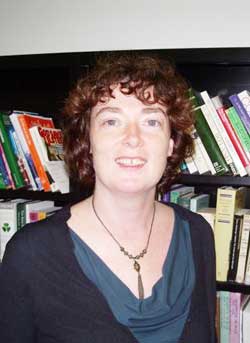Complexity of Irish literature

Margaret Kelleher is an expert on Irish literature and is visiting Concordia from the National University of Ireland.
courtesy of canadian Irish students
When your country is famous for its way with words and its literature has been produced in no fewer than eight languages, it’s the brave scholar who undertakes a two-volume, 1,286-page literary history. Margaret Kelleher is such a scholar, and she’s spending this term at Concordia.
The Cambridge History of Irish Literature, which she edited with Philip O’Leary, rated the lead review — a rave — in a recent issue of the Times Literary Supplement. For a writer, that’s the equivalent of going platinum.
The TLS reviewer was taken with the way the editors tackled the ambiguities of “literary” and “history,” even “Irish” and a term all too familiar to Canadians, “nation.” Moreover, their approach is highly inclusive. What they define as Irish literature appears not only in English but also in Old Irish, modern Irish, early modern English, Old Norse, Norman French, Ulster Scots and Latin.
Kelleher is also a hit in the classroom. One of her students confessed that on the way to the university one gloomy evening, she had asked herself, “Why am I doing this?” Afterwards, she told Kelleher, she realized “it was to hear the way you use language.”
She is teaching two courses, an English 300 seminar on history and memory in Irish literature and a course on “famine literature,” in which writing about the mid-19th-century Irish famine is compared and contrasted with writing about famines in India, Africa, and other places.
Her home institution is the National University of Ireland, Maynooth, near Dublin. She came to Concordia through Michael Kenneally, Director of Concordia’s Centre for Canadian Irish Studies, whom she met when he was President of the International Association for the Study of Irish Literature.
She likes her students and the way they freely share their opinions, although she’s less impressed with their ability to express their thoughts in writing.
Parallels between Ireland and Quebec, with their similar colonial and religious backgrounds, are irresistible. She was fascinated by a SSHRC-sponsored Ireland-Quebec workshop she attended recently in which a participant said it was important to study “small, stated societies.”
“The bilingualism of Montreal impresses me,” Kelleher said. It’s an issue that’s never far from notice in Ireland, where the indigenous language has been reborn. There are new novels and plays aplenty in Irish. Subjects are as contemporary as you please, and translation often goes straight from the Gaelic to, say, Czech or Polish.
“It’s the oldest written vernacular literature in Europe,” she said proudly. “It’s complex and open — a really vibrant language.”
She admires the “quality of engagement” her Concordia students show towards these issues, and was pleased to hear one of them suggest that writers who choose to write in Irish rather than English are consciously linking themselves with other minority languages. Once the country that sent out its emigrants to the world, Ireland is itself becoming a country of immigrants and minorities.
Margaret Kelleher, the O’Brien Visiting Scholar, will give a public lecture on Nov. 17 on “1,500 Years of Irish Literary History.” at 7 p.m. in the York Amphitheatre, EV 1.615.